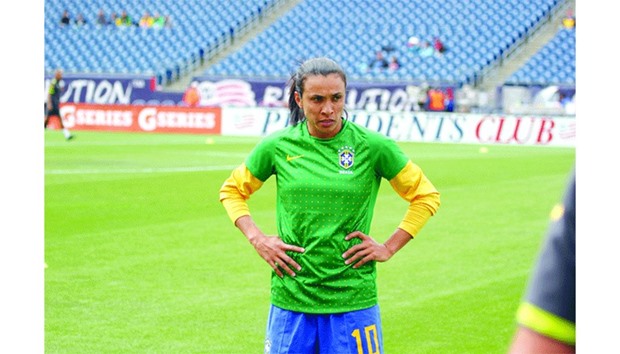From the moment she burst on to the scene, Marta was hailed as something special. As a 17-year-old, she was called up to the Brazil squad for the 2003 Women’s World Cup; the year after that, she scored three goals at the Athens Olympics as the team won a silver medal; as a 21-year-old, she was the linchpin of Brazil’s success as they finished second in China, picking up the individual accolades of the Golden Ball and the Golden Boot along the way.
She went in to the 2007 tournament as the FIFA women’s world player of the year, so expectations were high. She met them—and then won the same award for five consecutive years, showing that the pressure was nothing to her.
In 2015 she became the top goalscorer in Women’s World Cup history, scoring her 15th against South Korea; perhaps breaking that particular record was no surprise when she averages a goal a game at international level.
That is not to say that her career has been easy. Brazil is historically not the most supportive country of women’s football. She has talked about her childhood games, recalling that she would happily join in the boys’ matches,
occasionally skipping school in favour of football; and she has added with a touch of self-deprecation: “I was never the last to be picked when teams were selected.”
Of course she wasn’t. Marta’s close control of the ball, taste for trickery and innate nose for goal are assets to any side. She has always claimed that she never had any footballing idols as a child, although she admired Rivaldo, and loved the clips she had seen of Pele.
It’s perhaps no wonder that the media, always keen for an easy comparison, took to calling Marta “Pele in a skirt”, a nickname the man himself endorsed.
If only she’d had exactly the same support and publicity as her forerunner.
Her biographer couldn’t find a
publisher in Brazil, and she hasn’t been able to play in her home country for more than a handful of games because the structure for professional women’s football simply isn’t there.
Instead she’s been an asset to teams in the USA as well as in Sweden—although the financial implosion of women’s clubs is an all-too-regular occurrence, meaning that she has rapidly had to move on. Now 30, she leads the line for FC Rosengard in the Swedish Damallsvenskan; and she has often talked about how she misses her family, left behind as she pursues her nomadic career, and crediting them as her inspiration. Like so many pioneers, she acknowledges that she has had to sacrifice a settled home life for football.
As well as blazing a trail on the pitch, though, she is working to ensure that future generations can follow their footballing dreams in their home countries, taking on the role of ambassador for FIFA’s ‘Live Your Goals’ campaign, a mission to provide girls and women around the world with the opportunity to play football at all levels.
She has been urging her own country to take action for many years, asking for governmental and financial support for women’s football, and pointing out that all the success she had achieved individually and with the national team had simply not been capitalized on by the powers-that-be.
A decade ago, as she revelled in her individual and team awards, she admitted: “I struggled for this all my life and I can’t feel but proud when I know that little girls and even boys who only dream at being professional players look up to me as an example.”
They will be able to marvel at her skill on the global stage again this month as she joins the Brazil squad for the Rio Olympics—her fourth Games—and the hosts will be focused on a medal after missing out in London last time round.
Her former teammate Sofia Jakobssen of Sweden is looking forward to playing against her old friend in the group stage, recalling: “With her technique and speed, she could do anything she wanted on the field. I still think she’s the best player in the world. I wanted to be like her but of course I didn’t have all the same attributes. It’s like a men’s player wanting to be like Messi—you can’t copy someone like that.”
Marta is one of the shining stars of the women’s game—and her brilliance shows no signs of dimming quite yet.

Marta
